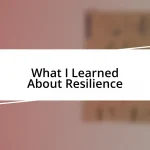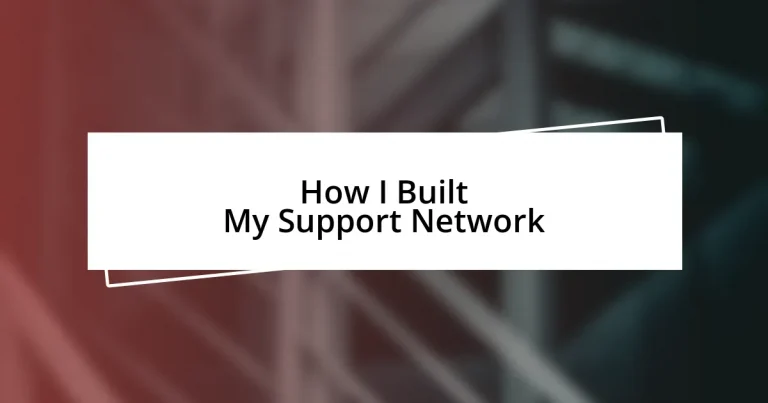Key takeaways:
- A support network is vital for personal growth and can include diverse connections such as friends, family, and colleagues.
- Identifying support needs through self-reflection helps in finding the right people who can provide the necessary emotional or practical assistance.
- Building trust and nurturing relationships requires consistent effort and vulnerability, which enhances the quality of connections.
- Leveraging technology, such as social media and communication apps, can significantly strengthen support networks and keep relationships vibrant.
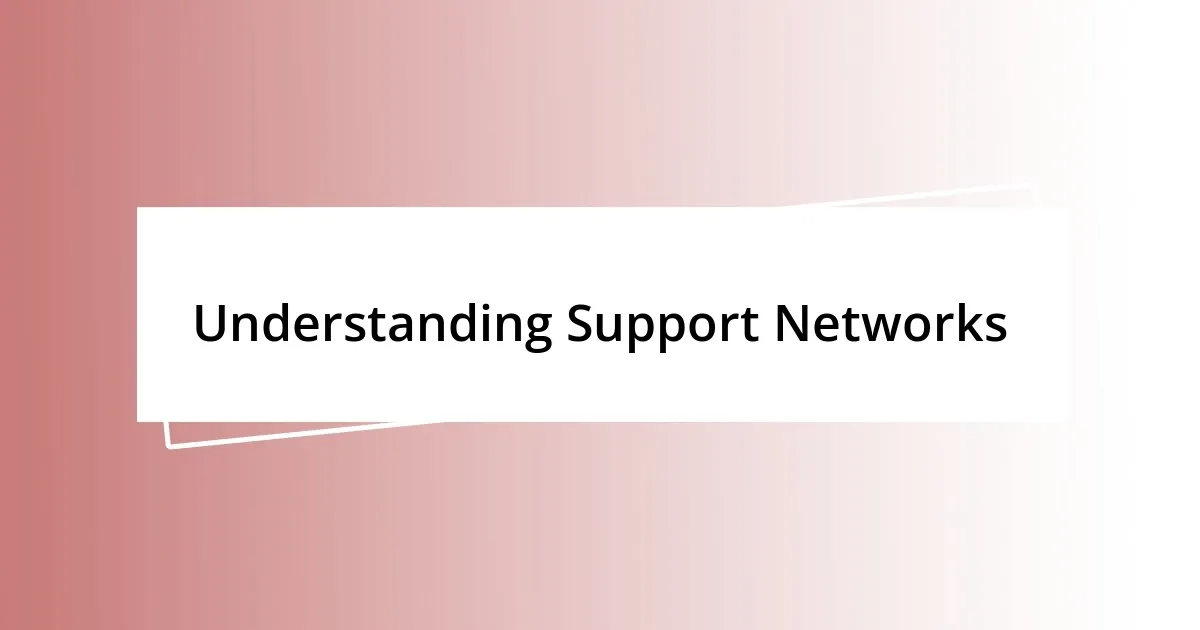
Understanding Support Networks
A support network is fundamentally about relationships that uplift and guide us. I remember when I faced a significant career challenge; reaching out to mentors not only opened new doors but also provided the emotional backing I needed. Have you ever considered how a simple conversation can rekindle your sense of direction?
When I think about the threads that weave an effective support network, I realize it often combines friends, family, colleagues, and even acquaintances. Each connection plays a unique role—my closest friends offer a listening ear, while colleagues share invaluable insights. Isn’t it fascinating how diverse perspectives can enhance our understanding of personal challenges?
Building a support network requires both intention and vulnerability. I’ve learned that being open about my struggles fosters deeper connections. What if, by just sharing your authentic self, you provided someone else with the courage to do the same? Embracing this reciprocity can transform your relationships and create a nurturing environment where everyone feels valued.
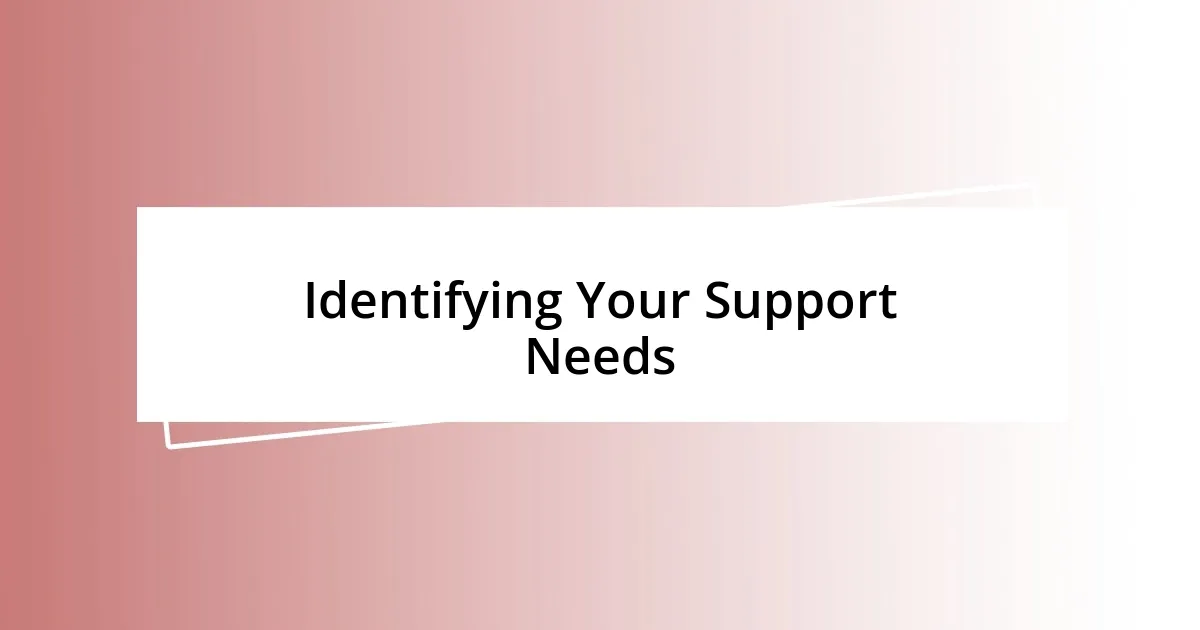
Identifying Your Support Needs
Identifying your support needs starts with self-reflection. I often pause to consider which challenges I face and what kind of support would truly help me through. It’s like solving a puzzle; when I pinpoint the missing pieces, it becomes easier to find the right people to fill those gaps. Sometimes it’s just about reassurance; at other times, it’s strategic advice or simply someone to share a laugh with.
Here are some questions to consider when assessing your support needs:
– What specific challenges am I currently facing?
– Do I need emotional support, practical advice, or a mix of both?
– Who in my life inspires me to be better?
– How do I prefer to receive support—through conversation, encouragement, or active help?
– Am I comfortable being vulnerable with those around me?
Reflecting on these facets can illuminate the paths to your unique support network.
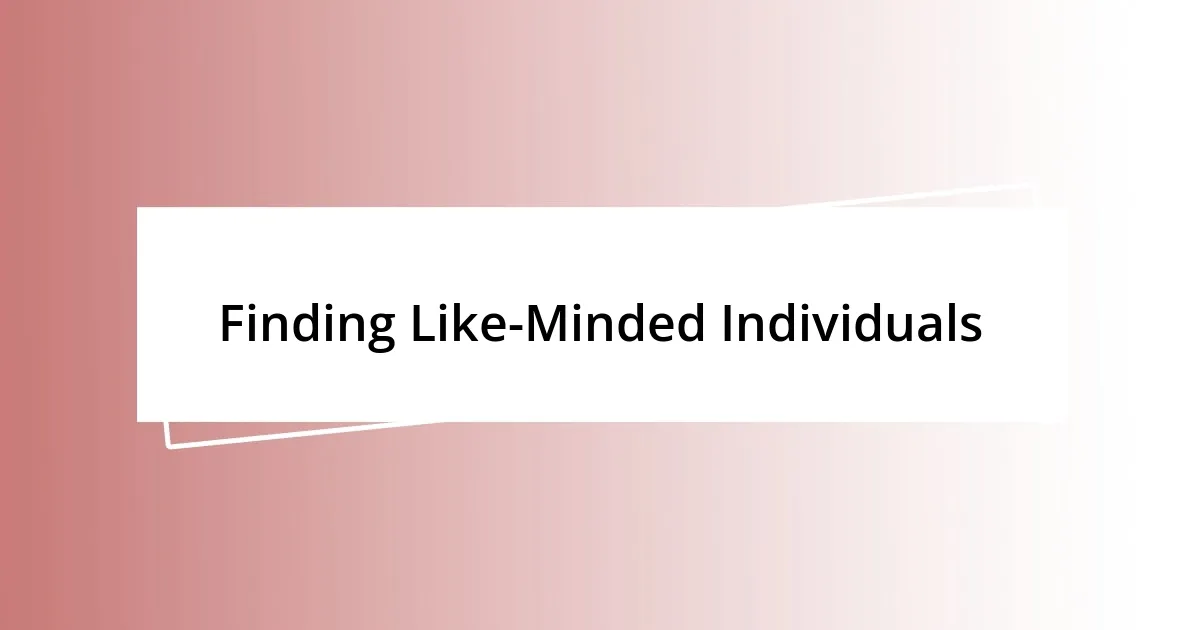
Finding Like-Minded Individuals
Finding individuals who resonate with your values can truly elevate your support network. Looking back, I remember attending a workshop for aspiring entrepreneurs where I met several like-minded individuals. We shared not just ideas, but also our fears and aspirations, creating a sense of camaraderie that felt almost instant. Have you ever experienced that bond where you just click with someone’s thoughts and passions? It’s a beautiful moment that reinforces the importance of connection.
I’ve often found that engaging in hobbies or interest groups can help in bringing together people with similar outlooks. It was during a local book club that I met a group of readers who challenged my interpretations and broadened my mindset. Sharing thoughts over our favorite novels turned into meaningful discussions that eventually evolved into strong friendships. Isn’t it interesting how a simple commonality, like a love for storytelling, can serve as the foundation for a robust support network?
Social media platforms also play a significant role in nurturing connections with like-minded individuals. I’ve utilized various online communities to connect with people who share my interests, whether it’s in health and wellness or personal development. I once participated in an online mentoring program where I met someone who shares my passion for mindfulness practices. This virtual connection led us to regularly share insights and motivate one another, proving that even digital spaces can blossom into meaningful relationships.
| Method | Description |
|---|---|
| Workshops and Seminars | Opportunities to meet individuals with similar goals and experiences, often leading to deep conversations. |
| Interest Groups | Shared passions like book clubs or crafting communities can help forge bonds through shared activities. |
| Online Communities | Digital platforms allow for broader connections and ongoing interactions with those who resonate with your interests. |
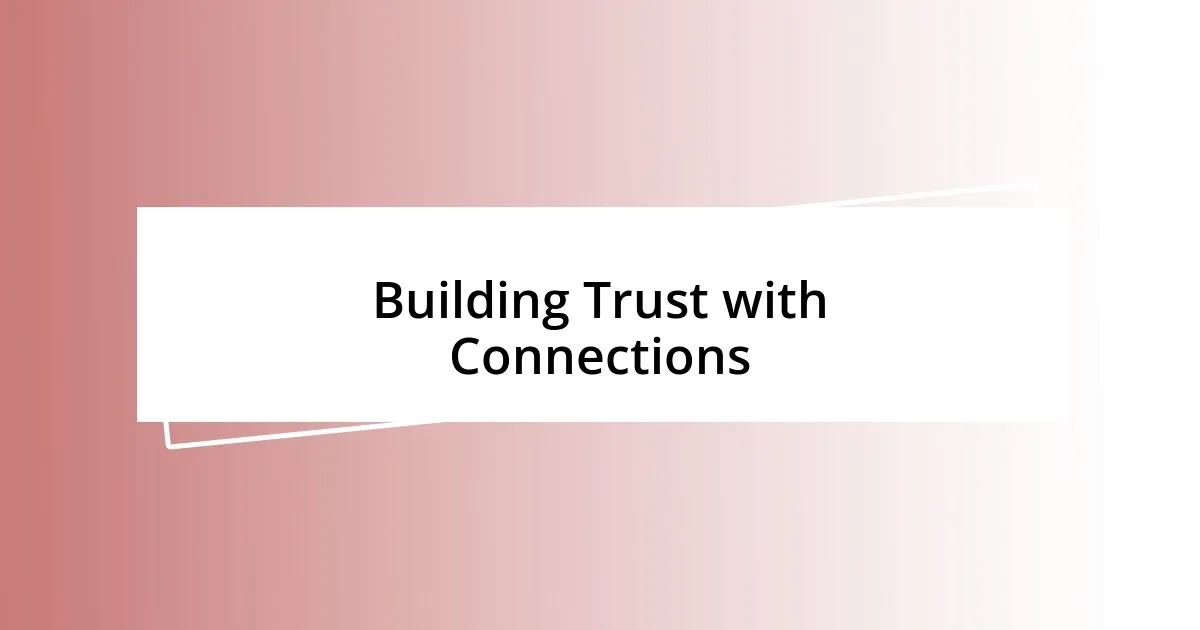
Building Trust with Connections
Building trust is truly the foundation of any meaningful connection. I remember having a candid coffee chat with a colleague, where we both opened up about our vulnerabilities. That moment of honesty wasn’t just refreshing but also marked the beginning of a supportive friendship. How many times have you shared a piece of your story and felt an instant relief when the other person resonated with it?
It’s crucial that trust develops gradually over time. I’ve often found that consistency in my actions speaks louder than words. If I commit to supporting someone during tough times, following through on that promise creates a solid trust bridge. Have you noticed how small gestures of reliability can have a huge impact? Just showing up—whether it’s for a scheduled call or offering a helping hand—reinforces that bond of trust.
Moreover, being transparent about my own needs fosters a sense of mutual vulnerability. I recall a time when I admitted to a friend my struggles in balancing work and personal life. Instead of judgment, I found understanding and even encouragement, as they shared their own experiences. This reciprocal openness not only strengthened our connection but also facilitated a space for genuine support. Isn’t it remarkable how sharing our challenges can pave the way for deeper trust?
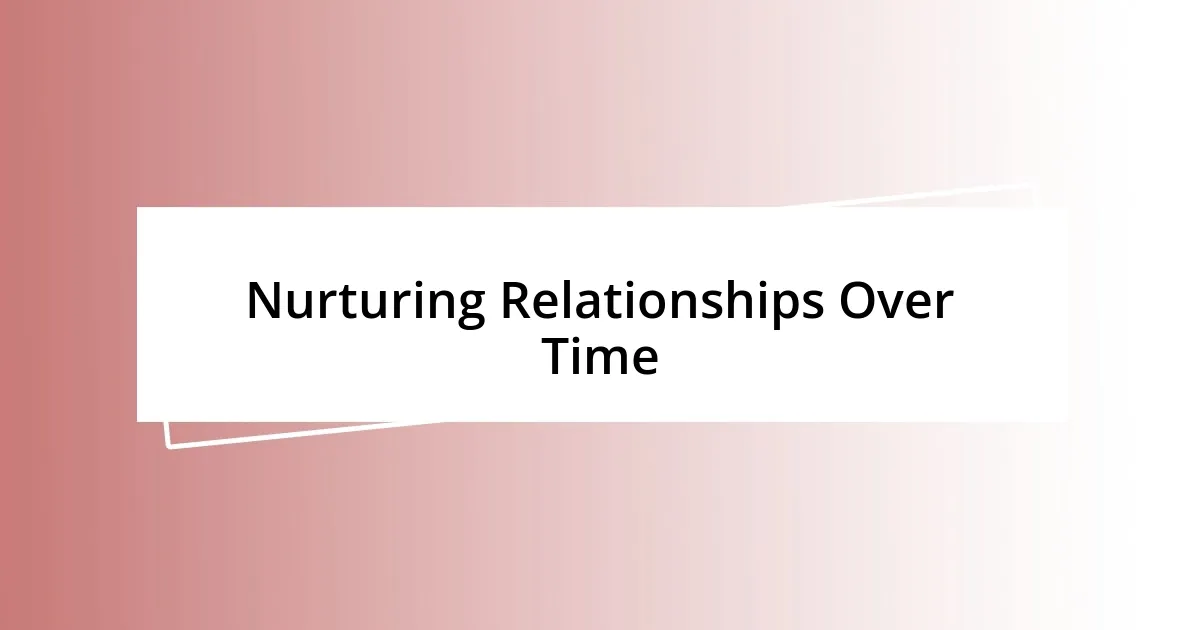
Nurturing Relationships Over Time
Nurturing relationships takes effort, but the rewards are profound. I’ve learned that regular check-ins with friends, whether a quick text or a coffee date, keep our connections vibrant. For instance, I make it a habit to set a monthly reminder to reach out to my old college buddy. Those seemingly small gestures often lead to deeper conversations that remind us of our shared history, don’t you think?
Time spent together often showcases genuine care and understanding. I vividly remember planning a surprise birthday gathering for a close friend—it was a labor of love that took hours of coordination. Seeing their face light up felt like a testament to our bond. Have you ever organized something meaningful for someone special? The joy it brings can create shared experiences that further enrich the relationship.
Moreover, I notice that being adaptable is key in nurturing these connections. Life can get busy and schedules change, yet I make it a point to go with the flow. For example, when a friend’s work commitments made our usual weekly catch-up challenging, I suggested virtual hangouts. Being flexible helps us maintain that connection, even when life throws curveballs. How do you stay connected when your routine gets disrupted? It’s a reminder that true support sometimes means being willing to shift gears for one another.
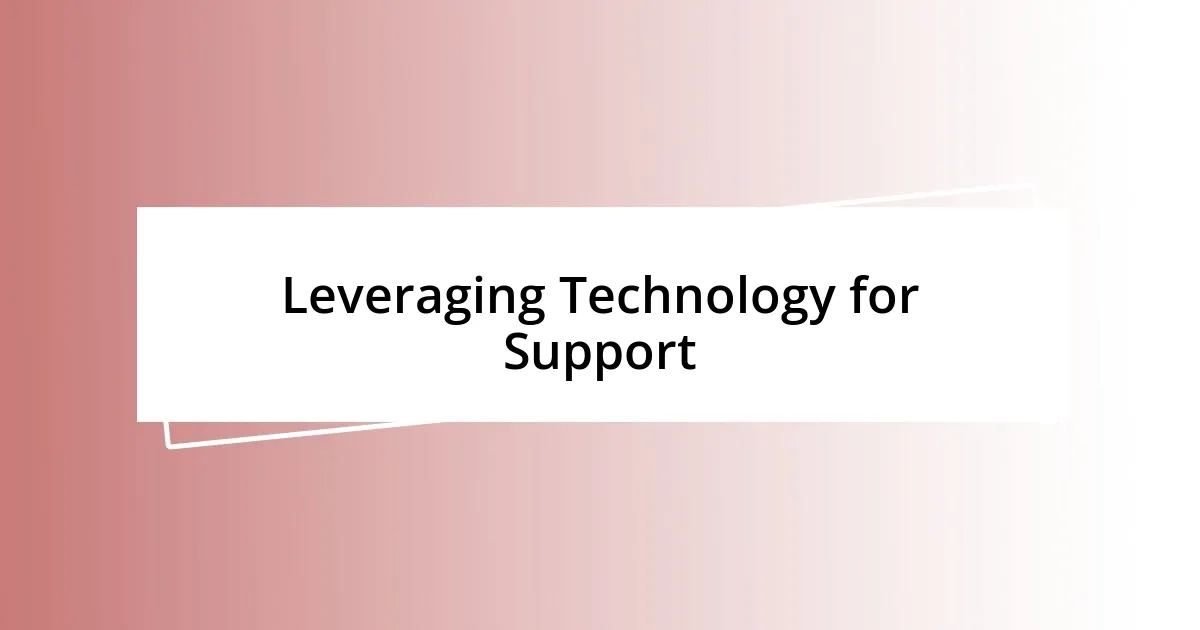
Leveraging Technology for Support
Leveraging technology has become a game-changer for building my support network. I’ve turned to apps like GroupMe for coordinating with loved ones, especially during stressful times. Just the other day, I created a group chat with a few friends where we could share quick updates and check in with each other. Doesn’t it feel comforting to know someone’s just a message away when you need them?
Video calls have also added another layer of connection. I still remember the sense of camaraderie I felt during a virtual game night with friends spread across different cities. We laughed, shared stories, and kept our spirits high despite the distance. Isn’t it amazing how platforms like Zoom can turn a dreary evening into a night filled with laughter and warmth?
On a more practical note, I use organizational tools like Trello to keep track of my goals and share progress with my accountability partners. This collaborative effort not only keeps me motivated but also sparks insightful conversations about our journeys. Have you ever felt the drive that comes from sharing your successes and challenges with someone who genuinely cares? It’s in these digital interactions that I’ve found support to flourish, making technology not just a tool, but a true ally in fostering my personal connections.

Evaluating and Adjusting Your Network
Evaluating my support network is a critical step I’ve come to appreciate. It’s not just about keeping people around; it’s about ensuring that these relationships are mutually beneficial. Recently, I took a long, hard look at my connections and noticed some friendships felt more draining than enriching. Have you ever re-evaluated a relationship only to realize it’s time to move on? I find that trusting my instincts often leads me to healthier dynamics.
Adjusting your network can be a transformative process. I remember a time when I was feeling overwhelmed, and I reached out to a friend who always brought positivity into my life. That conversation opened my eyes—I realized I needed to focus more on those who uplift me, rather than those who brought me down. The shift in my energy after that was palpable. Has a simple chat ever shifted your perspective on key relationships? Taking that leap to refocus can redefine your support system.
As I continue to evaluate my network, I also make it a point to be honest about my own boundaries. There was a period when I was stretched too thin, trying to support everyone without considering my own needs. I learned the hard way that it’s okay to prioritize self-care. Have you ever felt guilty for taking a step back? I’ve discovered that setting boundaries not only protects my well-being but also helps the people I care about understand the importance of mutual support.
